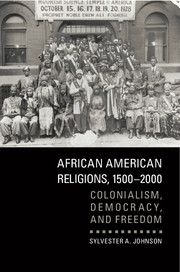Book contents
- Frontmatter
- Contents
- List of Figures
- Acknowledgments
- Introduction
- PART ONE
- PART TWO
- 4 Stateless Bodies, African Missions, and the Black Christian Settler Colony
- 5 Black Political Theology, White Redemption, and Soldiers for Empire
- PART THREE
- Conclusion: Black Religion, Freedom, and Colonialism
- Selected Bibliography
- Index
5 - Black Political Theology, White Redemption, and Soldiers for Empire
from PART TWO
Published online by Cambridge University Press: 05 August 2015
- Frontmatter
- Contents
- List of Figures
- Acknowledgments
- Introduction
- PART ONE
- PART TWO
- 4 Stateless Bodies, African Missions, and the Black Christian Settler Colony
- 5 Black Political Theology, White Redemption, and Soldiers for Empire
- PART THREE
- Conclusion: Black Religion, Freedom, and Colonialism
- Selected Bibliography
- Index
Summary
During the latter half of the nineteenth century, African Americans would face what seemed the most dramatic and cataclysmic shift in the architecture of race and social power: the transition from formal chattel slavery to an elaborate system of legal apartheid. A violent civil war, constituting the largest slave rebellion on record, would bring an end to chattel slavery. In its place the racial state instituted Reconstruction, a short-lived program of radical reform that relied on strict mandates for racial parity and military occupation to protect Blacks from White terrorist rule. In the absence of slavery, White Americans grew more desperate to racialize space, status, and access to a range of citizenship privileges. The result was the formalization of apartheid, and by 1896 the nation's highest court articulated an explicit defense (Plessy v. Ferguson) of this legal principle. Equally important was the expansion of naked brutality – anti-Black terrorism – as a central extralegal means of enforcing the colonial order of White political power. Both this explicit legal sanction and the extralegal apparatus of racial terrorism reinscribed the colonial relation of power, further relegating Blacks to the status of subjugated, stateless peoples.
African Americans perceived this colonial relation of power quite differently in the absence of formal slavery. It seemed, after all, more or less tractable when operating within slavery. Black participation in democracy seemed within reach and appeared on an individual basis to be a matter of manumission. So, on a collective basis, there is no question that African Americans genuinely believed the dissolution of slavery would make multiracial democracy a reality and spell the demise of racial subjugation. Progressive Whites shared the same conviction. So did the fiercest opponents of multiracial democracy, which was why they adamantly and desperately defended slavery. With the benefit of hindsight, it is evident that they were all wrong. Dissolution of slavery did not achieve multiracial democracy. Absent the relatively respectable idiom of chattel slavery, moreover, the uncloaked violence of White supremacy became routine, particularly through the murderous spectacle of lynching. This is precisely why the last decades of the nineteenth century challenged both the activist efforts and explicative capacities of African Americans.
- Type
- Chapter
- Information
- African American Religions, 1500–2000Colonialism, Democracy, and Freedom, pp. 209 - 270Publisher: Cambridge University PressPrint publication year: 2015



